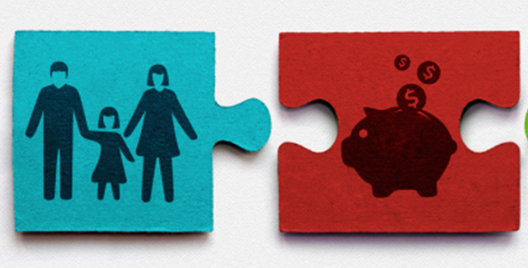
How Discontent Ruins Your Life – And 4 Ways To Beat It. (Pt 1)
How Discontent Ruins Your Life – And 4 Ways To Beat It. (Pt 1)
Why is it that more now than ever before, we buy things we don’t need, with money we don’t have, to impress people we hardly like?
Before I get into this, can I admit something?
I wish I had more money than I do. Like almost all parents I know, many of life’s pressures would be alleviated by a little (and sometimes a lot) more income.
This may be a justified desire. But it’s also a very dangerous one. Especially when I consider that I already am in the top 5% of the world’s earners (according to globalrichlist.com).
In my first post of this 5-part series, I explored the reasons we should spend less than we earn: the margin reduces stress, and enables generosity and long-term investment. Then in posts 2 and 3, based on research involving 100s of people, I shared stacks of ways to slash your bills and save you wads of cash every month.
In this and then the final post, I want to go deeper. To get to the heart of the matter.
If we just follow the pragmatic advice from the previous posts, we’ll run the risk of overlooking the subconscious, self-sabotaging drive that causes us to violate that advice again and again. If we all know how to spend less, why do we tend to spend more than we earn?
We’re discontent.
The dictionary defines this noun as ‘a restless desire or craving for something one does not have.’
At the centre of discontent is the usually-subconscious belief that having more stuff or experiences will make my life more complete.
And the moment we believe that, we’re screwed.
HOW DISCONTENT RUINS YOUR LIFE
1. Discontent feeds consumer addiction.
Every new acquirement may provide a shot of confidence and happiness, but the kick is as short-lived as a single-shot espresso. As the high abates, a restless desire for the next thing takes its place.
Now that you’re on the hamster-wheel, the more you get, the more you need. This desire to acquire is highly addictive. And like all addictions, it eats into your vital resources – especially your money and time. Just consider the ever-escalating levels of consumer debt, coupled with the chronic lack of spare time most people now have (thanks to longer working hours in order to earn more to acquire more).
2. Discontent makes us one more rat in a rat race.
Let’s move from hamsters to rats.
What happens when millions of people share the same addiction? Society becomes a rat-race.
Don’t believe we’ve become rats? Just check out blackfridaydeathcount.com. We’re meant to love people and use things, but when discontent sets in, we easily use people and love things.
How do we become rats? Our lack of reflection about the fact that we are addicted to stuff in the first place is rat-like. Rats are driven by appetite not reflection or values. Perhaps the biggest clue that we don’t give thought to our drive to gain more is that the word ‘discontent’ dropped in use by a third from 1800 to 1900, and another third by 2016.
Though discontent has always been part of the human experience, the rising tide of world-wide access to stuff and wealth has only served to exacerbated the syndrome. More cheese has simply made more rats, and made us more rat-like.
My point? To the extent we believe that having more will make us more, we devalue and diminish ourselves and walk over each other in the process. Gaining more, we become less.
Alain De Botton in his book, Status Anxiety, puts this masterfully: “Blessed with riches and possibilities far beyond anything imagined by ancestors who tilled the unpredictable soil, modern populations have nonetheless shown a remarkable capacity to feel that neither who they are nor what they have is quite enough.”
In my next post I will mention 2 equally alarming ways discontent damages us, but for now I hope you feel some motivation to break free. Here’s how…
4 WAYS TO BEAT DISCONTENT
The first job of parents is to teach our kids how to live. If discontent has got its roots in you, then it already has its roots in them. Time to get free yourself, and then pass the wisdom onto your kids.
By the way, it’s not going to go quickly. One big decision (to become a content person rather than an acquiring person) will need to be followed by a 100 smaller ones, decisions such as these…
1. Distinguish between needs and wants.
My 3 year old told me, ‘Daddy, I need choccies.’
‘Need or want?’ I asked. ‘Need means you can’t live with out it, like air and water. Want means it’s nice but you can live without it.’
Her unflinching reply? ‘Daddy, I NEED them!‘
The consumerism of our day has blinded us to the difference. Now, I’m not saying we can never have what we want, nor that we should compromise on things like functionality and safety. (For example, Julie and I opted to pay more for a safer family vehicle). But let’s at least recognise the difference between our necessities and preferences. Refuse to let luxuries slip into the necessities category in your mind.
2. Beware of using shopping as therapy.
On the way home from surfing together, my buddy told me that since his wife started working again they are doing much better financially. I asked if he was referring to the bonus of a second income. ‘No’, he explained, ‘with all that time on her hands, she’d shop for an emotional lift. Work has provided an alternate stimulation.’
I am not having a go at women here. But the stats do tend to lean towards females on this one: 79 percent of women go on spending sprees to cheer themselves up, according to a 2009 study by the University of Hertfordshire. And 40 percent of the women surveyed named ‘depression’ as a reason to go shopping.
I don’t believe this is always dysfunctional by the way, something we can track back to what happened in our past. Perhaps our hunter-gatherer pasts live on in the neurochemistry of our brains.
The gathering women of millennia ago would gather 100s of fruits and vegetables every week. But for every 1000 small things that the women-gatherer would find, the dude-hunter would drag in one big animal. In modern terms, that’s often something very expensive – like a new car. Or an expensive hobby.
Back to our century – we must learn how to admire without having to acquire. It’s a fundamental aspect of contentment.
3. Prioritise character over accumulation.
Surely, who we are is worth far more than what we have?
Our culture is not so sure. Steven Covey observes that in the 20th century, the success-ethic tragically eclipsed the character-ethic in public consciousness.
In the age of get-rich-quick schemes, get-famous-quick youtube videos, microwaves and MacDonalds, anything that takes a long time to develop – like character – is devalued.
But can a billion people be wrong? Yup. The cultivation of our character should be paramount to us. That’s if we have anything to learn from 1000s of years of accrued wisdom – before the age of instant gratification fell upon us.
There’s so many character traits to develop, but let me speak about the two that relate to money: discipline and contentment:
Discipline. I am not talking about self-deprivation for the sake of it. I am talking about saying no to something now so you can say yes to something greater later.
Discipline relates to money because…
Discipline tends to lead to abundance.
There’s a direct link between things like goal-setting, delay-gratification, endurance and hard work, and accruing wealth! All good so far. The problem is that…
Abundance tends to undermine discipline.
This two-way connection (‘discipline creates abundance which erodes discipline’) accounts for the rise and fall of your life financially, every bit as much as it explains the rise and fall of global economies (think of the cash crisis of recent years) and civilisations.
So, the key is to not just sustain discipline until abundance comes, but to continue with it as a character quality once it does. Failure to do so just cuts off the branch you’re sitting on.
Contentment. The way to overcome discontent is by developing the character trait of contentment – being happy with who you are regardless of what you have, cultivating a sense of completeness that is unrelated to the acquisition and consumption of experiences and things.
In my opinion, contentment is something deeper than happiness. Happiness is more short-lived, and hinges upon circumstances. This is why, despite popular opinion, money can buy happiness (to a degree of course).
But money cannot buy contentment.
In fact money can’t buy any character trait at all.
And what a pity when we spend the lion’s share of our lives living for more money – and forget to intentionally, daily, habitually cultivate character.
Let me bring this home with a story. What happens when we pursue money, but neglect the formation of traits like discipline and contentment?
A friend of my wife was happily married to a financially struggling man. After years of slog and setbacks, they made it big. The discipline and humility she once admired in him quickly fell away. He got upgrades of everything – a new (over)confident demeanour, a new bigger house, a new faster car – and a new younger wife. A decade on, he’s still acquiring more and more stuff, but isn’t close to achieving contentment. His ex-wife on the other hand, has far less than she used to have but has dedicated her life to lifting up others. She’s started an NGO and her life is full of, not possessions, but people and purpose.
4. Invest in your relationships with people.
Our culture has swapped the price-tags – things of great value are perceived as cheap, and things of little real value are highly coveted. Unless we critically reflect on this simple fact, we’ll be duped.
You want lasting happiness (and longevity thrown in)? A longitudinal study has shown that it’s found in the quality of your relationships not the accumulation of wealth and achievement. Society’s price tags are all wrong!
How sad that so many of us spend far more time weekly buying stuff than playing with our kids. (In the USA, the average parent spends 6 hours a week shopping and only 40 minutes playing with their kids.)
As I learnt from a sage earlier this year (I wrote about it here), we justify our time away from the family by saying we’re doing it for the family. By all means, earn an income. Work hard. Enjoy the fruits of your labour. But remember who you’re doing it all for, and make sure you’re not just focused on acquiring money, but more quality time with the people you love and a richer character too.
One last story. My dad died when I was 16. He was 36. I still remember my last chat with him by his hospital bed. He did not say, ‘I wish that I worked longer hours and earned more. Terran, make a success of your life!’
Nope! These were his words…
‘Terran, I wish I had spent more time with you boys. I love you. Please love and look after your brother and mom when I am gone.’
One day you will be on your deathbed. What will matter to you then? Well, let it matter to you today.
A lot to think about, I know – this self-searching subject has got my head spinning too.
But I have only told you the half of it…
In my final post I will share 2 more ways discontent is ruining our lives, and 4 more ways to beat it.
While you wait for that, read a blog my lovely and clever wife wrote on the subject a few years ago.
Comments
Also published on Medium.




